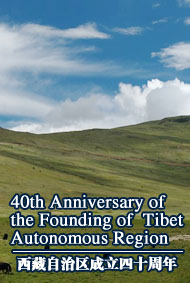|
Tibet's First King
( 2005-10-27 )
At the time when the Tibetans were ruled by twelve petty chieftains, there was much discontent and fighting in the divided country.
It is said one day in 237 BC, 12 Tibetan priests came across a strange young man. When they asked him who he was and where he came from, the boy answered that he was a "mighty one" and pointed to India across the mountains as his home. However, the priests thought he was pointing to the heavens and so declared him a god.
Thinking the young man was the "son of the god," the priests mounted him on the "chair" made up of the necks of four men, and declared, "We shall make him our lord," and so he was known as "the neck chair mighty one" and was the first king of all Tibet.
There is another tale concerning the same young man that has been handed down for ages: A woman in the Boyu (today's Bomi) area of India had nine children. The youngest son was no normal child, for he was born with turquoise eyebrows, overhanging eyelids, and webbed fingers. The family was most distressed and frightened by this strange freak-of-nature child. They wanted to be rid of the boy, so they placed him in a lead box and threw it into the Ganges River.
The boy, however, did not die; instead, he was found by a peasant, who upon opening the box and finding the strange child inside was filled with much love for him, and took him home to live as one of his family. So the boy spent a happy childhood, loved and cared for by the peasant and his wife.
When the boy became an adult the peasant thought it was time the boy knew about his strange beginnings, and so he told the boy about how he was found in a lead box by the Ganges River. So that the boy would not feel that he had been abandoned, the peasant tried to convince him that he was a very special person, in truth a "mighty one" of high birth.
The boy, however, was saddened when he heard the peasant's story, for he had always believed that he was a part of the peasant's family and viewed the man as his father. In grief the boy fled to the Himalayas and crossed the border of Tibet, wanting to spend his days alone in the shelter of the mountains. But it was there he met the above twelve Tibetan priests. The boy later became the first king of all Tibet.
|

